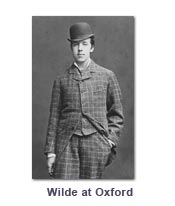Date/Time
Monday, April 25, 2011
4:00 pm PDT
Location
Little Theater, Macgowan Hall
245 Charles E. Young Dr., East
—a lecture by Elisha Cohn, Ahmanson-Getty Fellow 2010–11, UCLA

This paper considers Oscar Wilde’s ongoing interest in the image of a single brain cell as a souvenir of intense human experience in a world of matter. Taking a long view of Wilde’s career that demonstrates the relevance to his literary work of his college interests in physiology and philosophy, this paper shows how Wilde’s perspective can be explained alongside an analysis of the theories of Ernst Haekel, W. K. Clifford, and Gabriel Tarde. These writers, who apply aesthetic vocabularies to their own discussions of cells, illuminate Wilde’s representations of the cell as an aesthetic object. In imagining the visual pleasures of invisible brain cells, Wilde adapts scientific ideas without relinquishing sensual beauty as his ultimate value, suggesting that though early brain science is a relevant context for aestheticism, its effects are provocative yet disjunctive, instigating but not determining.
Elisha Cohn is an Ahmanson-Getty Fellow at UCLA’s Clark Library. She received her Ph.D. at Johns Hopkins University. She has published essays in Nineteenth-Century Literature and ARIEL: A Review of International English Literature, and has an essay forthcoming in SEL: Studies in English Literature. Her book project, Suspended Agency: Affective Form in Victorian Literature, considers the significance of reverie and trance in Victorian aesthetics. In August 2011 Elisha Cohn begins a tenure-track appointment in the Department of English, Cornell University.

